Viawater.nl
OECD Principles on
Water Governance
Welcomed by Ministers at the OECD Ministerial
Council Meeting on 4 June 2015
Directorate for Public Governance and Territorial Development
The global pressures on water and related sectors around the world call for action:
Accessible and high quality freshwater is a limited and highly variable resource. OECD projections
show that 40% of the world's population currently lives in water-stressed river basins, and that water demand will rise by 55% by 2050 (OECD, 2012a).
Over-abstraction and contamination of aquifers worldwide will pose significant challenges to food
security, the health of ecosystems and safe drinking water supply, and increase the risk of subsidence, among other consequences.
In 2050, 240 million people are expected to remain without access to clean water, and 1.4 billion
without access to basic sanitation.
Water infrastructure in the OECD area is ageing, the technology is outdated and governance
systems are often ill-equipped to handle rising demand, environmental challenges, continued urbanisation, climate variability and water disasters.
Significant investment is required to renew and upgrade infrastructure, estimated at USD 6.7
trillion by 2050 for water supply and sanitation, while including a wider range of water-related infrastructure could triple that bill by 2030 (OECD, 2015c)
The water sector holds intrinsic characteristics that make it highly sensitive to and dependent on
multi-level governance.
Water connects across sectors, places and people, as well as geographic and temporal scales. In most
cases, hydrological boundaries and administrative perimeters do not coincide.
Freshwater management (surface and groundwater) is both a global and local concern, and involves
a plethora of public, private and non-profit stakeholders in the decision-making, policy and project cycles.
Water is a highly capital-intensive and monopolistic sector, with important market failures where co-
ordination is essential.
Water policy is inherently complex and strongly linked to domains that are critical for development,
including health, environment, agriculture, energy, spatial planning, regional development and poverty alleviation.
To varying degrees, countries have allocated increasingly complex and resource-intensive
responsibilities to sub-national governments, resulting in interdependencies across levels of government that require co-ordination to mitigate fragmentation.
Coping with future water challenges raises not only the question of "what to do?" but also "who does
what?", "why?", "at which level of government?" and "how?". Policy responses will only be viable if they are coherent, if stakeholders are properly engaged, if well-designed regulatory frameworks are in place, if there is adequate and accessible information, and if there is sufficient capacity, integrity and transparency.
To fit for the future, institutions need to adapt to changing circumstances, and political will and policy
continuity are key in the transition towards more inclusive and sustainable practices
Cover photo credits: AridOcean/Shutterstock.com
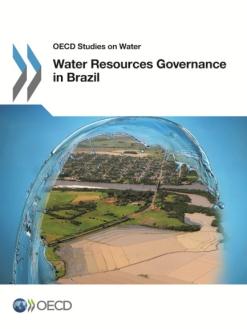
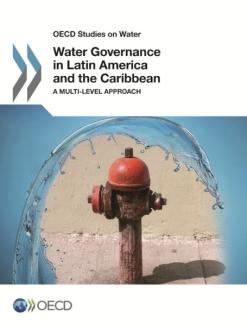
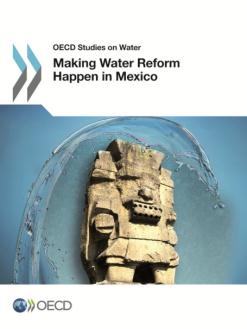
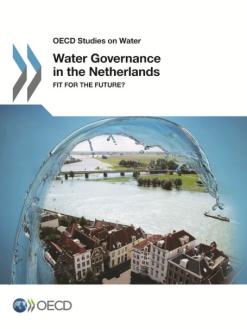
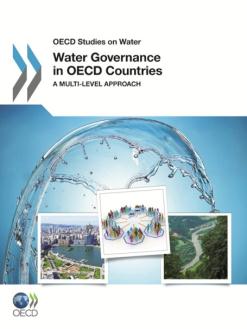
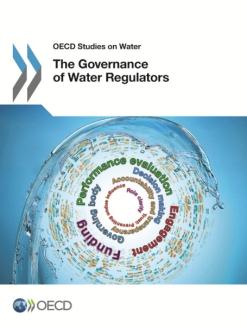
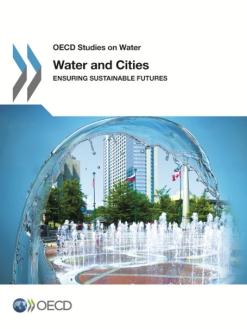
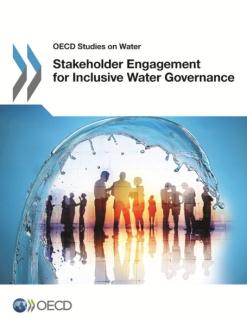
Since 2010, the OECD has provided evidence on the main governance gaps hindering water policy
design and implementation, and suggested a set of policy responses and good practices for overcoming them. The "OECD Multi-level Governance Framework: Mind the Gaps, Bridge the Gaps" was developed as an analytical framework and tool for policymakers to identify and bridge governance challenges that affect, to a greater or lesser extent, all countries, regardless of their institutional setting, water availability or degree of decentralisation.
Multi-level Governance Framework: Mind the Gaps, Bridge the Gaps
Policy gap
MULTI-LEVEL
GOVERNANCE
Funding gap
Capacity gap
Source: OECD (2011), Water Governance in OECD: A Multi-Level Approach, OECD Publishing, Paris
This analytical framework was used to review water governance arrangements in 17 OECD countries
(2011) and 13 Latin American countries (2012) as well as to carry out in-depth national multi-stakeholder policy dialogues in support of water reforms in Mexico (2013), Netherlands (2014), Jordan (2014), Tunisia (2014) and Brazil (2015). Thematic knowledge and policy guidance were also developed on stakeholder engagement, urban water management as well as the governance of water regulators (2015).
OECD evidence shows that there is not a one-size-fits-all solution to water challenges worldwide, but
rather a large diversity of situations within and across countries. Governance responses should therefore be adapted to territorial specificities, and recognising that governance is highly context-dependent and important to fit water policies to places.
But the governance landscape for freshwater management has changed in the last 25 years.
Information flows more easily and potentially sheds greater light on deficiencies, failures and poor practices. Decentralisation resulted in opportunities to customise policies to local realities, but also raised capacity and co-ordination challenges in the delivery of public services.
There is now an enhanced recognition that bottom-up and inclusive decision-making is key to
effective water policies. In addition, a number of legal frameworks have triggered major evolutions in water policy; however their implementation has faced governance bottlenecks, as is the case of the EU Water Framework Directive which has spearheaded many recommendations hereinafter proposed, the United Nations Millennium Development Goals and the United Nations General Assembly Resolution of 28 July 2010 entitled "The Human Right to Water and Sanitation".
Last but not least, the application of the concept of "Integrated Water Resources Management" has
brought uneven results within and across countries, and requires operationalisation frameworks that consider the short, medium and long term in a consistent and sustainable way. In the light of such implementation challenges, the Principles seek to assist governments at all levels to strengthen water governance to fit for current and future water challenges.
Coping with current and future challenges requires robust public policies, targeting measurable
objectives in pre-determined time-schedules at the appropriate scale, relying on a clear assignment of duties across responsible authorities and subject to regular monitoring and evaluation.
Water governance can greatly contribute to the design and implementation of such policies, in a
shared responsibility across levels of government, civil society, business and the broader range of stakeholders who have an important role to play alongside policy-makers to reap the economic, social and environmental benefits of good water governance.
The OECD Principles on Water Governance intend to contribute to tangible and outcome-oriented
public policies, based on three mutually reinforcing and complementary dimensions of water governance:
Effectiveness relates to the contribution of governance to define clear sustainable water policy goals
and targets at all levels of government, to implement those policy goals, and to meet expected targets.
Efficiency relates to the contribution of governance to maximise the benefits of sustainable water
management and welfare at the least cost to society.
Trust and Engagement relate to the contribution of governance to building public confidence and
ensuring inclusiveness of stakeholders through democratic legitimacy and fairness for society at large.
Overview of OECD Principles on Water Governance
The OECD Principles on Water Governance are expected to contribute to improving the "Water
Governance Cycle" from policy design to implementation.
good ernance
water gov Cycle
Source: Forthcoming, OECD Working Paper, 2015, Water Governance Indicators
To better water governance
The OECD Principles on Water Governance are developed on
the premise that there is no one-size-fits-all solution to water challenges worldwide, but a menu of options building on the diversity of legal, administrative and organisational systems within and across countries. They recognise that governance is highly contextual, that water policies need to be tailored to different water resources and places, and that governance responses have to adapt to changing circumstances.
The Principles are rooted in broader principles of good
governance: legitimacy, transparency, accountability, human rights,
rule of law and inclusiveness. As such, they consider water
governance as a means to an end rather than an end in itself, i.e. the
range of political, institutional and administrative rules, practices and
processes (formal and informal) through which decisions are taken
and implemented, stakeholders can articulate their interests and have
their concerns considered, and decision-makers are held accountable
for water management.
The Principles aim to enhance water governance systems that help manage "too much", "too little"
and "too polluted" water in a sustainable, integrated and inclusive way, at an acceptable cost, and in a reasonable time-frame. They consider that governance is good if it can help to solve key water challenges, using a combination of bottom-up and top-down processes while fostering constructive state-society relations. It is bad if it generates undue transaction costs and does not respond to place-based needs.
The Principles consider that water governance systems (more or less formal, complex, and costly)
should be designed according to the challenges they are required to address. This problem-solving approach means that "forms" of water governance should follow "functions" of water governance. Structuring, institutionalising, and/or formalising institutions should not detract from the ultimate objective of delivering sufficient water of good quality, while maintaining or improving the ecological integrity of water bodies.
The OECD led the thematic group on "Good Governance" up to the 6th World Water Forum
(Marseille, March 2012). A community of practice of 300+ stakeholders was set-up as part of the preparatory process of the Forum to organise nine thematic sessions. Discussions on governance in Marseille concluded with the need for robust policy guidelines to provide a common frame of reference for governments at all levels, in support of better governance of water policy.
As a follow-up, the OECD Water Governance Initiative1 (WGI) was created on 27-28 March 2013 as
a multi-stakeholder platform of 100+ delegates from public, private and non-profit sectors that would gather every six months in a Policy Forum. Since then, the WGI has invested significant efforts in ensuring continuity and collective action to scale up governance responses to water challenges.
6th World Water Forum Governance Targets and Coordinators (March 2012)
By 2015, 50% of countries will have adopted consultation, participation and co-ordination
mechanism allowing sta
tries w nd international
consultation, participation and co-ordination
effectively contribute to
egional, national and international levels to
2021, 100% will have done so.
effectively contribute to decision-making in a coherent, holistic and integrated way. By
Target 2
By 2015, 50% countries will have strengthened regulatory frameworks and adopted
performance indicators (service delivery)
rg onitor
et 1 and evaluate water policies; and all
By 2015, 50% countries will have strengthened regulatory frameworks and adopted
have put in place capacity-
% of national and
ave adopted consultation, participation and co-ordination
performance indicators (service delivery) to monitor and evaluate water policies; and all
foster good governance in service delivery
a countries will
takehol ne so.
at local, regional, national and international levels to
2021, 100% will have done so.
foster good governance in service delivery. By 2018, all countries will have done so.
By 2021, increase by 30% the number of river basin management plans (analysis of initial
gthened regulatory frameworks and adopted
By 2015, 50% of countries will have adopted cons
By 2015, 50% of coun
tak eholders at local, regional, national and
ut in place capacity-building processes at national and local level to
ltation, par the nu
an countries with
u es). security diagnoses and governance
effectively contribute to decision-making in a coherent, holistic
ce in service delivery. By 2018, all countries will have done so.
mechanism allowing stakeholders at local, reg
2021, 100% will have done s tools,
tional leinternational)
regulatory and legislative
effectively contribute to decision-maki ng in a
2021, 100% will have done so.
By 2015, 50% countries will have strengthened regulatory
status and main issues).
performance indicators (serv Targe
cal, national, international) regulatory and legislative
countries will have put in p By
acit countries will
y-building pr hav
By 2015, 50% of countries will have adopted consultation, participation
By 2015, 50% countries will have strengthened regulatory frameworks an
IW RM mechanisms.
foster good governance in ser diagno
that anti-corruption policies
mechanism allowing stakeholders at local, regional, national and international levels to
performance indicators (service delivery) to m
By 2015, increase the number of countries with water security diagnoses and governance
ater ective.
tribute to decision-making in a coherent, holistic and integrated
tools, based on existing (local, national, international) regulatory and legislative
countries will have put in place capacit
2021, 100% will have done so.
building processes at national and local
By 2021, increase by 30% the number of river basin managemen
foster good governance
By 2018, 30 countries will have committed to promote integrity in the water sector,
countries will have done so.
, countries will
uption policies
countries will have strengthened regulatory frameworks and adopted
By 2018, 30 countries will have committed to promote integrity in the water sector,
performance indicators (service deliv
nal and international levels to
By 2021, increase by 30% the number of river basin management plans (analysis of
countries will have put in place capac
heren transparency
ption risks, and ensure that anti-corruption policies
and integrated way. By
foster good gover
ms. ha abil
rget ater
6 sector.
e well implemented and effective.
2021, 100% will have done so.
By 2018, 30 arent water budget processes, including
By 2021, increase by 30% the numb
By 2015, increase the number of countries with water security diagnoses an
01 the water sector,
8, 30 countries will be implementing: transparent water budget processes, including
information about water infrastructure investment planning and implementation (financial,
status and main issues).
diagnose/map existing or potential corruption risks, and ensure that anti-corruption policies
tools, based on existing (local, national, i
5, 50% countries win
mentation (financial,
are well implemented and effective.
d s and tools for improving transparency
frameworks and IWRM mechanisms.
technical, and socioeconomic impacts); and methods and tools for improving transparency
performance indicators (service delivery) to monitor and evaluate water policies; and all
By 2015, increase the number of co
et 6 with water security diag an
countries will have put in place capacity-building processes at national and local level to
5 ng (local,
udget p r ocesses, including
frameworks and IWRM mechanisms.
in formation about
018, all countries will have done so.
By 2018, 30 countries will have committed to promote integrity in the water sector,
technical, and socioeconomic impacts); and methods and tools for improving transparency
diagnose/map existing
licies vernance tools among which 55 are
By 2018, 30 countries will have committed to promote integrity
are well implemented and effective.
diagnose/map existing or potential corruption risks, and ensure that anti-corruption policies
lans (analysis of initial
are well implemented and effective.
is suinstruments,
to a broad range of initiatives and
programmes, guidelines, handbooks and practical tools. The inventory is
By 2018, 30 countries will be implementing: transparent water budget processes, including
By 2018, 30 countries will be imp
lementing: transparent water budg structu
issues of stakeholder engagement; performance
information about water infrastructure investment planning and implementation (financial,
information about water infrastructure investment planning an
dia gnoses and governance
technical, and socioeconomic impacts); and methods and tools for improving transparency
technical, and socioeconomic impacts); and methods and tools for i
tools, based on existing (local, national, international) regulatory and legislative
and accountability within the water sector.
and accountability within the water sector.
frameworks and IWRM mechanisms.
This stock taking exercise shed light on the value added of
developing OECD Principles that would provide a systemic framework
By 2018, 30 countries will have committed to promote integrity in the water sector,
to identify and address water governance gaps, building on international
diagnose/map existing or potential corruption risks, and ensure that anti-corruption policies
are well implemented and effective.
By 2018, 30 countries will be implementing: transparent water budget processes, including information about water infrastructure investment planning and implementation (financial, technical, and socioeconomic impacts); and methods and tools for improving transparency
accountability within the water sector.
The Principles on Water Governance have been developed and discussed through a bottom-up and
multi-stakeholder process within the WGI, under the umbrella and guidance of the OECD Regional Development Policy Committee and in close cooperation with the OECD Regulatory Policy Committee and its network of Economic Regulators. In addition, extensive consultation was carried out across a range of OECD committees and subsidiary bodies including the Environment Policy Committee and its Working Party on Biodiversity, Water and Ecosystems, the Public Governance Committee and its Working Party of Senior Public Integrity Officials, the Development Assistance Committee, the Committee on Investment and the Committee on Agriculture.
The Principles were discussed at the 33rd meeting of the Regional Development Policy Committee on
29-30 April 2015 and approved by the Committee through written procedure on 11 May 2015. The OECD Council welcomed the Principles on 13 May 2015 and agreed to transmit them to Ministers, who gave their backing to the Principles at the meeting of the Council at Ministerial level on 4 June 2015.
The OECD Principles on Water Governance provide a framework to understand whether water
governance systems are performing optimally and help to adjust them where necessary. They can catalyse efforts for making good practices more visible, learning from international experience, and setting reform processes into motion at all levels of government to facilitate change where and when needed. They can also help avoid traps and pitfalls, learning from international experience.
The Principles are based on the following considerations:
Meeting current and future water challenges requires robust public policies, targeting measurable
objectives in pre-determined time-schedules at the appropriate scale, relying on a clear assignment of duties across responsible authorities and subject to regular monitoring and evaluation.
Effective, efficient and inclusive water governance contribute to the design and implementation
of such policies, in a shared responsibility across levels of government and in co-operation with the relevant stakeholders to meet current and future water challenges.
There cannot be a single, uniform policy response to the water challenges worldwide given the
diversity of situations within and across countries in terms of legal and institutional frameworks, cultural practices, as well as climatic, geographic and economic conditions at the origin of diverse water challenges and policy responses.
It is therefore appropriate for interested Members and non-Members to use these Principles to
design and implement their national policies in light of country-specific circumstances.
Water governance is an important component of the overall framework of water policies; broader
principles of good governance apply to the water sector, and water governance outcomes can also be contingent on progress in other domains of the water policy framework.
These Principles are relevant for all levels of government and could be disseminated widely
within interested Members and non-Members.
The OECD can assist interested Members and non-Members in reaching these standards and
identifying best practices. In its future work, the Regional Development Policy Committee will make the necessary proposals for the follow-up on the Principles.
These Principles will be taken into consideration during future OECD work on water.
The Principles apply to the overarching water policy cycle and should be implemented in a systemic
and inclusive manner.
As such, they do not make distinctions across:
water management functions (e.g. drinking water
supply, sanitation, flood protection, water quality, water quantity, rainwater, and storm-water);
water uses (e.g. domestic, industry, agriculture,
energy and environment), and
ownership of water management, resources and assets
(e.g. public, private, mixed).
cidepix/Shutterstock.com
Principle 1. Clearly allocate and distinguish roles and responsibilities for water policymaking, policy
implementation, operational management and regulation, and foster co-ordination across these
responsible authorities.
To that effect, legal and institutional frameworks should:
a) Specify the allocation of roles and responsibilities, across all levels of government and water-
related institutions in regard to water
Policy-making, especially priority setting and strategic planning; Policy implementation especially financing and budgeting, data and information, stakeholder
engagement, capacity development and evaluation;
Operational management, especially service delivery, infrastructure operation and investment;
Regulation and enforcement, especially tariff setting, standards, licensing, monitoring and
supervision, control and audit, and conflict management;
b) Help identify and address gaps, overlaps and conflicts of interest through effective co-ordination at
and across all levels of government.
Principle 2. Manage water at the appropriate scale(s) within integrated basin governance systems to
reflect local conditions, and foster co-ordination between the different scales.
To that effect, water management practices and tools should:
a) Respond to long-term environmental, economic and social objectives with a view to making the
best use of water resources, through risk prevention and integrated water resources management;
b) Encourage a sound hydrological cycle management from capture and distribution of freshwater to
the release of wastewater and return flows;
c) Promote adaptive and mitigation strategies, action programs and measures based on clear and
coherent mandates, through effective basin management plans that are consistent with national policies and local conditions;
d) Promote multi-level co-operation among users, stakeholders and levels of government for the
management of water resources; and,
e) Enhance riparian co-operation on the use of transboundary freshwater resources.
Principle 3. Encourage policy coherence through effective cross-sectoral co-ordination, especially
between policies for water and the environment, health, energy, agriculture, industry, spatial
planning and land use through:
a) Encouraging co-ordination mechanisms to facilitate coherent policies across ministries, public
agencies and levels of government, including cross-sectoral plans;
b) Fostering co-ordinated management of use, protection and clean-up of water resources, taking into
account policies that affect water availability, quality and demand (e.g. agriculture, forestry, mining, energy, fisheries, transportation, recreation, and navigation) as well as risk prevention;
c) Identifying, assessing and addressing the barriers to policy coherence from practices, policies and
regulations within and beyond the water sector, using monitoring, reporting and reviews; and
d) Providing incentives and regulations to mitigate conflicts among sectoral strategies, bringing these
strategies into line with water management needs and finding solutions that fit with local governance and norms.
Principle 4. Adapt the level of capacity of responsible authorities to the complexity of water
challenges to be met, and to the set of competencies required to carry out their duties, through:
a) Identifying and addressing capacity gaps to implement integrated water resources management,
notably for planning, rule-making, project management, finance, budgeting, data collection and monitoring, risk management and evaluation;
b) Matching the level of technical, financial and institutional capacity in water governance systems to
the nature of problems and needs;
c) Encouraging adaptive and evolving assignment of competences upon demonstration of capacity,
where appropriate;
d) Promoting hiring of public officials and water professionals that uses merit-based, transparent
processes and are independent from political cycles; and
e) Promoting education and training of water professionals to strengthen the capacity of water
institutions as well as stakeholders at large and to foster co-operation and knowledge-sharing
Principle 5. Produce, update, and share timely, consistent, comparable and policy-relevant water
and water-related data and information, and use it to guide, assess and improve water policy, through:
a) Defining requirements for cost-effective and sustainable production and methods for sharing high
quality water and water-related data and information, e.g. on the status of water resources, water financing, environmental needs, socio-economic features and institutional mapping
b) Fostering effective co-ordination and experience sharing among organisations and agencies
producing water-related data between data producers and users, and across levels of government;
c) Promoting engagement with stakeholders in the design and implementation of water information
systems, and providing guidance on how such information should be shared to foster transparency, trust and comparability (e.g. data banks, reports, maps, diagrams, observatories);
d) Encouraging the design of harmonised and consistent information systems at the basin scale,
including in the case of transboundary water, to foster mutual confidence, reciprocity and comparability within the framework of agreements between riparian countries; and
e) Reviewing data collection, use, sharing and dissemination to identify overlaps and synergies and
track unnecessary data overload.
Principle 6. Ensure that governance arrangements help mobilise water finance and allocate
financial resources in an efficient, transparent and timely manner, through:
a) Promoting governance arrangements that help water institutions across levels of government raise
the necessary revenues to meet their mandates, building through for example principles such as the polluter-pays and user-pays principles, as well as payment for environmental services;
b) Carrying out sector reviews and strategic financial planning to assess short, medium and long term
investment and operational needs and take measures to help ensure availability and sustainability of such finance;
c) Adopting sound and transparent practices for budgeting and accounting that provide a clear picture
of water activities and any associated contingent liabilities including infrastructure investment, and aligning multi-annual strategic plans to annual budgets and medium-term priorities of governments;
d) Adopting mechanisms that foster the efficient and transparent allocation of water-related public
funds (e.g. through social contracts, scorecards, and audits); and
e) Minimising unnecessary administrative burdens related to public expenditure while preserving
fiduciary and fiscal safeguards.
Principle 7. Ensure that sound water management regulatory frameworks are effectively
implemented and enforced in pursuit of the public interest, through:
a) Ensuring a comprehensive, coherent and predictable legal and institutional framework that set
rules, standards and guidelines for achieving water policy outcomes, and encourage integrated long-term planning;
b) Ensuring that key regulatory functions are discharged across public agencies, dedicated institutions
and levels of government and that regulatory authorities are endowed with necessary resources;
c) Ensuring that rules, institutions and processes are well-co-ordinated, transparent, non-
discriminatory, participative and easy to understand and enforce;
d) Encouraging the use of regulatory tools (evaluation and consultation mechanisms) to foster the
quality of regulatory processes and make the results accessible to the public, where appropriate;
e) Setting clear, transparent and proportionate enforcement rules, procedures, incentives and tools
(including rewards and penalties) to promote compliance and achieve regulatory objectives in a cost-effective way; and
f) Ensuring that effective remedies can be claimed through non-discriminatory access to justice,
considering the range of options as appropriate.
Principle 8. Promote the adoption and implementation of innovative water governance practices
across responsible authorities, levels of government and relevant stakeholders, through:
a) Encouraging experimentation and pilot-testing on water governance, drawing lessons from success
and failures, and scaling up replicable practices;
b) Promoting social learning to facilitate dialogue and consensus-building, for example through
networking platforms, social media, Information and Communication Technologies (ICTs) and user-friendly interface (e.g. digital maps, big data, smart data and open data) and other means;
c) Promoting innovative ways to co-operate, to pool resources and capacity, to build synergies across
sectors and search for efficiency gains, notably through metropolitan governance, inter-municipal collaboration, urban-rural partnerships, and performance-based contracts; and
d) Promoting a strong science-policy interface to contribute to better water governance and bridge the
divide between scientific findings and water governance practices.
Principle 9. Mainstream integrity and transparency practices across water policies, water institutions
and water governance frameworks for greater accountability and trust in decision-making, through:
a) Promoting legal and institutional frameworks that hold decision-makers and stakeholders
accountable, such as the right to information and independent authorities to investigate water related issues and law enforcement ;
b) Encouraging norms, codes of conduct or charters on integrity and transparency in national or local
contexts and monitoring their implementation;
c) Establishing clear accountability and control mechanisms for transparent water policy making and
implementation ;
d) Diagnosing and mapping on a regular basis existing or potential drivers of corruption and risks in
all water-related institutions at different levels, including for public procurement; and
e) Adopting multi-stakeholder approaches, dedicated tools and action plans to identify and address
water integrity and transparency gaps (e.g. integrity scans/pacts, risk analysis, social witnesses)
Principle 10.
Promote stakeholder engagement for informed and outcome-oriented contributions
to water policy design and implementation, through:
a) Mapping public, private and non-profit actors who have a stake in the outcome or who are likely to
be affected by water-related decisions, as well as their responsibilities, core motivations and interactions;
b) Paying special attention to under-represented categories (youth, the poor, women, indigenous
people, domestic users) newcomers (property developers, institutional investors) and other water-related stakeholders and institutions;
c) Defining the line of decision-making and the expected use of stakeholders' inputs, and mitigating
power imbalances and risks of consultation capture from over-represented or overly vocal categories, as well as between expert and non-expert voices;
d) Encouraging capacity development of relevant stakeholders as well as accurate, timely and reliable
information, as appropriate;
e) Assessing the process and outcomes of stakeholder engagement to learn, adjust and improve
accordingly, including the evaluation of costs and benefits of engagement processes;
f) Promoting legal and institutional frameworks, organisational structures and responsible authorities
that are conducive to stakeholder engagement, taking account of local circumstances, needs and capacities; and
g) Customising the type and level of stakeholder engagement to the needs and keeping the process
flexible to adapt to changing circumstances.
Principle 11.
Encourage water governance frameworks that help manage trade-offs across water
users, rural and urban areas, and generations, through:
a) Promoting non-discriminatory participation in decision-making across people, especially
vulnerable groups and people living in remote areas;
b) Empowering local authorities and users to identify and address barriers to access quality water
services and resources and promoting rural-urban co-operation including through greater partnership between water institutions and spatial planners;
c) Promoting public debate on the risks and costs associated with too much, too little or too polluted
water to raise awareness, build consensus on who pays for what, and contribute to better affordability and sustainability now and in the future; and
d) Encouraging evidence-based assessment of the distributional consequences of water-related
policies on citizens, water users and places to guide decision-making.
Principle 12.
Promote regular monitoring and evaluation of water policy and governance where
appropriate, share the results with the public and make adjustments when needed, through:
a) Promoting dedicated institutions for monitoring and evaluation that are endowed with sufficient
capacity, appropriate degree of independence and resources as well as the necessary instruments;
b) Developing reliable monitoring and reporting mechanisms to effectively guide decision-making;
c) Assessing to what extent water policy fulfils the intended outcomes and water governance
frameworks are fit for purpose; and
d) Encouraging timely and transparent sharing of the evaluation results and adapting strategies as new
information become available.
The Daegu Multi-stakeholder Declaration on the OECD Principles on Water Governance is a tangible outcome of the multi-stakeholder approach underpinning the development of the Principles. It was handed to the OECD's Secretary General Angel Gurría at the 7th World Water Forum on 13 April 2015.
Daegu's Multi-stakeholder Declaration on the
OECD Principles on Water Governance
We, organisations from the public, private and non-profit sectors, major groups and individuals, actively
engaged in the OECD Water Governance Initiative (WGI), an innovative multi-stakeholder network of
120+ delegates gathering twice a year in a Policy Forum, strongly believe that water crises are often
governance crises and :
1. Fully support the OECD Principles on Water Governance as a solid framework to help national and
subnational governments design and implement better water policies for better lives, in cooperation with the broad range of stakeholders within and outside the water sector;
2. Applaud the bottom-up, multi-stakeholder and inclusive process behind the preparation of the
Principles since the creation of the Water Governance Initiative on 27 March 2013, as a follow-up to the OECD commitment made at the 6th World Water Forum (Marseille, 2012);
3. Call upon governments from OECD countries to approve the Principles at the 33rd meeting of the
Regional Development Policy Committee, 29 April 2015 and to give them a strong and high-level political impetus at the OECD Ministerial Council Meeting, 3-4 June 2015;
4. Look forward to the integration of the Principles into an OECD Recommendation to give them a
legal nature and strong moral force, and to provide a consensual baseline to identify and scale up best practices and trigger changes in governance and policy;
5. Invite developing and emerging countries to endorse the Principles and to adhere to the
subsequent Recommendation;
6. Pledge that all stakeholders use the Principles to guide their activities and practices in order to
strengthen the effectiveness, efficiency, trust and engagement in water governance;
7. Commit to disseminate the Principles widely within our organisations, to our members, networks,
partners and the public at large;
8. Invite the OECD to develop water governance indicators, with the same bottom-up and inclusive
process, to monitor progress in the implementation of the Principles, especially in the context of the Sustainable Development Goals;
9. Expect the Water Governance Initiative to continue playing an important role in gathering
international experience to facilitate benchmarking and peer-learning on each of the Principles;
Thank the OECD for its commitment and leadership and stand ready to contribute to future
collective efforts in support of good governance in the water sector.
Consult the Declaration online at:
During the session, a high level panel chaired by Peter Glas (Chairman, OECD Water Governance
Initiative) was composed of Jeong Yeon-man (Vice-Minister of Environment, Korea), Jean-Louis Chaussade (CEO, Suez Environnement), Francisco Nunes-Correia (President, Portuguese Water Partnership), Célia Blauel (President, Aqua Publica Europea), and Joppe Cramwinckel (Water Director, World Business Council on Sustainable Development). Panellists welcomed the OECD Principles as a stepping stone and valuable framework that can serve as a compass for decision makers and practitioners towards effective, efficient and inclusive water governance.
The Declaration gathers 65 signatures from organisations of the public, private and non-profit sectors,
major stakeholder groups and individuals, actively engaged in the OECD Water Governance Initiative, who committed to mainstream them into their activities and practices and to work further with the OECD to support the implementation of the Principles.
Jean-François Donzier
Permanent Technical Secretary, INBO
General Director, IOWater
Managing Director of the Knowledge Services,
Stockholm International Water Institute
Pierre-Alain Roche
President, ASTEE
Teun Bastemeijer
Chief Advisor Strategy and Programmes, Water
Integrity Network
Managing Director, Transparency International
Chief of Groundwater Section, UNESCO-IHP
Secretary General, European Irrigation Association
Dogan Altinbilek
President, International Water Resources Association
Director General, Global Institute for Water
Environment and Health
Executive Director, Institut Méditerranéen de
Cecilia Tortajada
Vice President, Third World Centre for Water
Management
President, Portuguese Association of Water and
Wastewater Services
Coordinator, Steering Committee member, Butterfly
Keizrul Bin Abdullah
Chairperson, Network of Asian River Basin
Organisation
Ignacio Castelao
Deputy Director, AcuaMed
Deputy Director, Udall Center for Studies in Public
Director, Water Resources Research Center
Directeur Général, AgroParisTech
Stefan Uhlenbrook
Vice Rector, UNESCO-IHE
Executive Director, International Water Association
Chief Executive Officer, K-water
President, Partenariat Français pour l'Eau
Michael Scoullos
Chairman, Global Water Partnership Mediterranean
President, Aqua Publica Europea
Rozemarijn Ter Horst
Coordinator, Water Youth Network
Miguel A. Rodenas
President, Segura River Basin Authority - Spain
Professsor of Economics, University of Paris
Executive Secretary, African Ministers' Council on
Roberto Olivares
General Director, National Association of Water and
Sanitation Utilities of Mexico
President, Dutch Water Authorities
María Ángeles Ureña Guillem
President, Júcar River Basin Authority - Spain
Martin Guespereau
Director general, Agence de l'Eau Rhône Méditerranée
Corse - France
Secretary General, Arno river Basin Authority - Italy
Scientific Director, Turin School of Local Regulation -
Fondazione per l'Ambiente
Secretary General, EurEau
Ursula Schaefer-Preuss
Chair, Global Water Partnership
Director, Water Governance Centre
Managing Director, Circle of Blue
Francisco Nunes Correia
President, Portuguese Water Partnership
Fernando Morcillo
President, Spanish Association of Water Supply and
Sanitation
Joppe Cramwinckel
Water Director, World Business Council for
Sustainable Development
Frédéric Molossi
President, Association française des EPTB
Gonzalo Robles Orozco
Vice-President, Spanish Agency for International
Cooperation for Development
Philippe Maillard
President, FP2E
Francisco Cabezas
General Director, Fundación IEA
Commissioner, Regulatory Authority for Electricity and
Gas and Water System - Italy
CEO, Véolia
H.F.M.W. van Rijswick
Professor, Utrecht University
Jean-Louis Chaussade
CEO, Suez Environnement
President, Water and Waste Services Regulation
Authority - Portugal
Member of the Governing Board, EDF
Professor, Erasmus University
Director, Centre for Comparative Water Policies and
Laws, University of South Australia
Mohamed Boussraoui
Executive Officer, United Cities and Local
Governments
Chairman of the Executive Council,
International Association for Water Law
Programme Manager, Global Water Operators
Partnerships Alliance
Jean-Philippe Bayon
Coordinator, UNDP Global Water Solidarity
President, National Committee on Water – France
Deputee, French National Assembly
Bernard Barraqué
Emeritus Research Director, Centre International de
Recherche de l'Environnement et de Développement
President, World Water Council
Principal Water Resources Specialist, Asian
Development Bank
Gérard Mestrallet
CEO, GDF-Suez
Senior WASH Advisor, ACF-France
Marco Lambertini
Director General, WWF International
Cover photo credits: AridOcean/Shutterstock.com
Further reading
OECD (2015a), Water Governance in Brazil, OECD Studies on Water, OECD Publishing;
OECD (2015b), Stakeholder Engagement for Inclusive Water Governance, OECD Studies on Water, OECD
OECD (2015c), The Governance of Water Regulators, OECD Studies on Water, OECD Publishing;
OECD (2015d), Water and Cities: Ensuring Sustainable Futures, OECD Studies on Water, OECD
OECD (2014), Water Governance in the Netherlands: Fit for the Future?, OECD Studies on Water, OECD Publishing
OECD (2014), Water Governance in Jordan: Overcoming the challenges to private sector participation, OECD S
OECD (2014), Water Governance in Tunisia: Overcoming the challenges to private sector participation, OECD S
OECD (2013), Making Water Reform Happen in Mexico, OECD Studies on Water, OECD Publishing;
Environmental
OECD (2012b), Water Governance in Latin America and the Caribbean: A Multi-level Approach, OECD Studies on Water, OECD Publishing;
OECD (2011), Water Governance in OECD Countries: A Multi-level Approach, OECD Studies on Water, OECD Publishing
For more information
Contact: Aziza Akhmouch, Head of the OECD Water Governance Programme
Email :– Phone number : + 33 1 45 24 79 30
Visit our Website
Source: https://www.viawater.nl/files/oecd-principles-on-water-governance-brochure.pdf
Lettre trimestrielle de l'Institut Français de Shiatsu Cet été fut riche en évènements. Cani- pond très clairement sur le sujet. « On ne peut cule (ben oui en été et surtout dans le midi), plus être écolo, il faut être humaniste »! L'éco- N° 19 – AUTOMNE 2006 zid.âneries, maillot jaune sâli, incendies au logie a besoin de terrain, de réalité et de pro-
CONCEPTOS CLAVES DE LA SOCIOLOGÍA JURÍDICA MODERNA Francisco Jaime Hidalgo* El Licenciado en Derecho deberá tener una base conceptual sólida, ya que necesita una serie de elementos para argumentar de manera lógica y Debemos tener presente que la Ciencia del Derecho es una disciplina compleja y muy diversificada; la Sociología Jurídica es una rama de especialización de ella, mediante la cual los Licenciados en Derecho adquieren los conceptos básicos que le darán un sustento firme a su desarrollo profesional, ya que mediante el correcto entendimiento y uso de los conceptos plasmados en este documento, los Licenciados en Derecho podemos interpretar, entender y comprobar los fenómenos sociales existentes y así, proponen soluciones, tanto sociales como jurídicas, que propicien el desarrollo sustentable de nuestras comunidades. Así, el Derecho se deberá abordar como arte, teoría y ciencia, ya que mediante él conocemos y regulamos nuestras pasiones y la de los otros.








